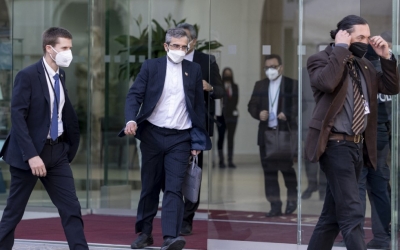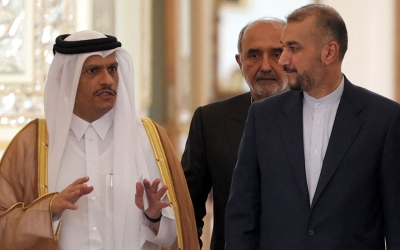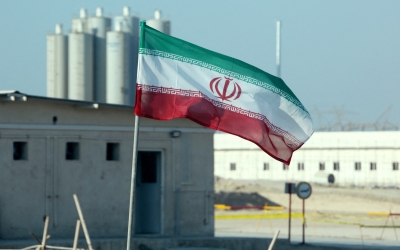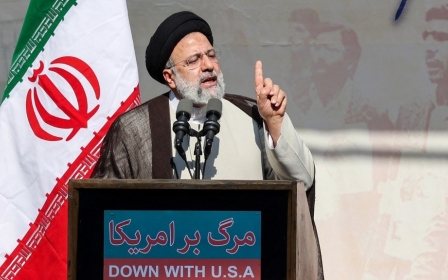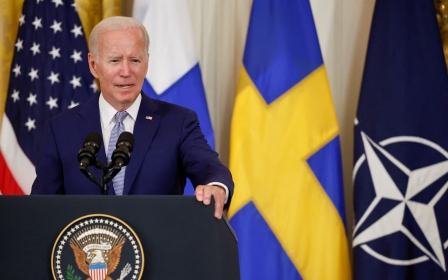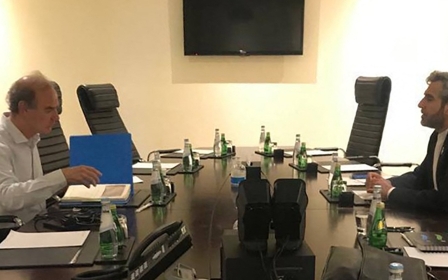Read the secret Revolutionary Guard bulletins that show Iran's internal nuclear conflict
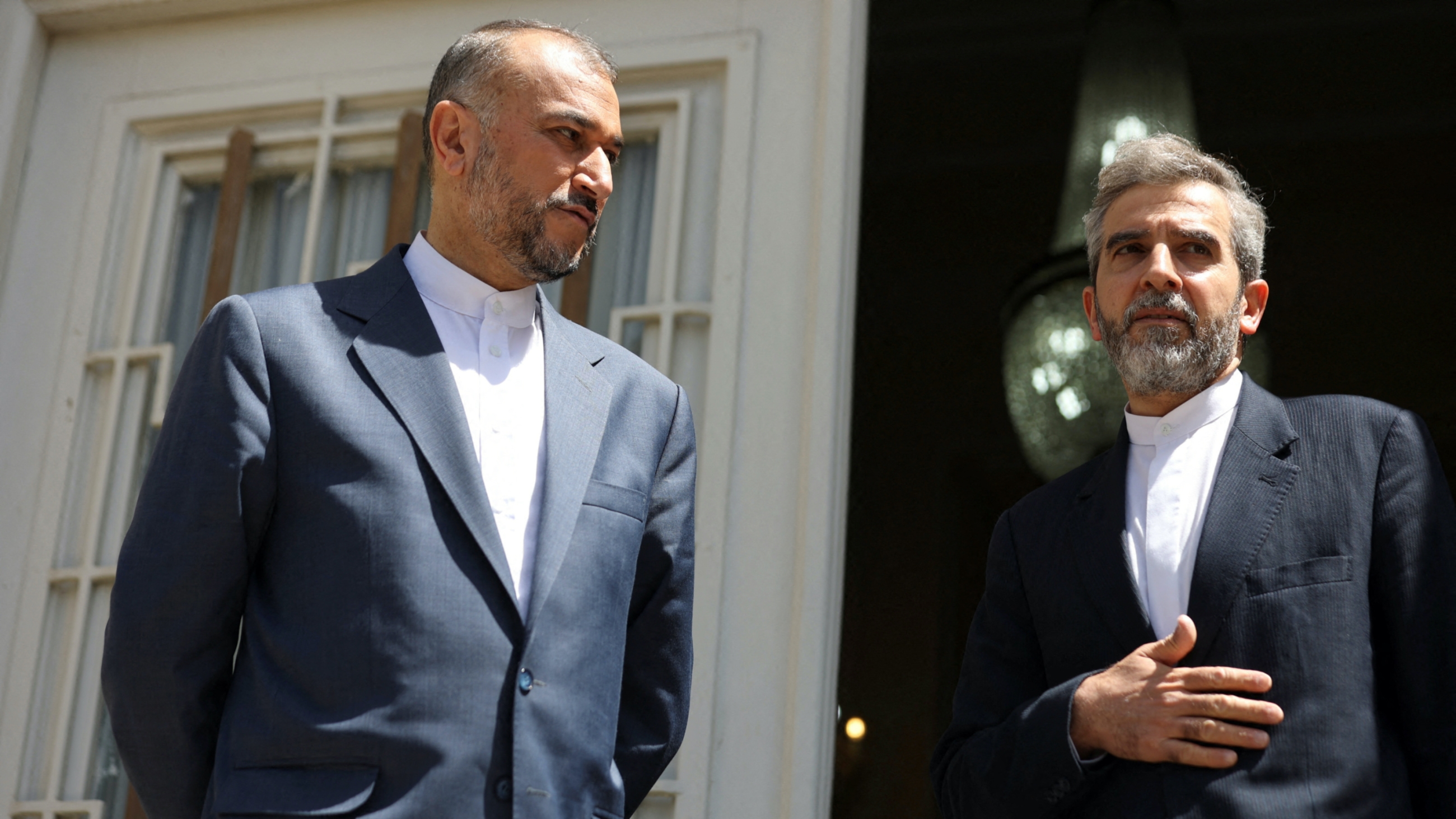
On 25 November, a group known as Black Rewards hacked the database of Iran's Islamic Revolutionary Guard Corps-affiliated Fars News Agency, including secret news bulletins for IRGC chief commander Hossein Salami.
Fars News has confirmed the hacking of its database but claimed that the secret bulletins' content were never fact-checked.
The leaked bulletins contain secret news about different issues in the country, including the talks between Iran and Washington to revive the 2015 nuclear deal, known as the Joint Comprehensive Plan of Action (JCPOA).
In 2015, Iran and the 5+1 - the five UN permanent Security Council members comprising the US, UK, France, Russia and China, along with Germany - reached a deal that would restrict Iran's nuclear programme in return for Washington lifting sanctions against the Islamic Republic.
Following former US President Donald Trump's withdrawal from the deal in 2018, which saw the reimposition of harsh sanctions, President Joe Biden launched talks with Tehran in April last year to revive the nuclear deal.
New MEE newsletter: Jerusalem Dispatch
Sign up to get the latest insights and analysis on Israel-Palestine, alongside Turkey Unpacked and other MEE newsletters
Negotiations, however, were put on hold in October, as neither side has shown complete willingness to agree to the other's demands. The final draft of the deal has been prepared and handed over to Tehran and Washington by the European Union. The US described Iran's first response to the draft as positive, but Tehran later sent another letter, with a different position, further complicating the talks.
Below is a selection of the most revealing parts of the leaks that show the internal conflict over the nuclear talks:
24 May bulletin
In a meeting with the head of the negotiation team Ali Bagheri Kani, Enrique Mora, the deputy head of the European Union's foreign policy, said that he was carrying a message from Biden to negotiate directly with Iran.
In his message, Biden claimed that the issue of the IRGC embargo should be resolved in separate negotiations.
During the meeting, Mora promised that if these proposals were accepted, [the sanctions on] the import of food, medicine, household goods and spare parts for airplanes would be lifted. Iran could then use its frozen assets to buy these items.
On 12 May, during his trip to Iran, Qatar's Emir Sheikh Tamim bin Hamad Al Thani met with Supreme Leader Ayatollah [Ali] Khamenei.
At the beginning of this meeting, Sheikh Tamim gifted Ayatollah Khamenei a page of the Holy Quran, the writing of which is attributed to Imam Hassan [the second Shia Imam].
Some experts believe that, considering he was carrying a message from US President Joe Biden about the talks for the revival of the JCPOA, choosing a page from the Quran written by Imam Hassan was a request [from Tehran] to show heroic flexibility [to reach a deal with Washington].
15 June bulletin
During his trip to Iran, Enrique Mora complained and said, "You [Iran] have gone behind the back of the Europeans [UK, France, and Germany] and are implementing an unwritten deal with the Americans."
After Mora's return to Europe, the Americans and Europeans have reacted strictly to Iran, and the calculations regarding the negotiations between Iran and the 4+1 group [not including the US] have changed. Experts have said that the process of active negotiations has stopped.
The Americans are hoping to hold tripartite negotiations between Iran, the United States and Oman or Dubai. Following new proposals, they have promised Iran that they will lift the sanctions on the purchase of grain and medicine and the embargo on steel and some other products.
6 July bulletin
In a threatening message to Iran, Enrique Mora said that in three weeks they would provide Iran with a draft to respond to. If Iran's answer is negative, the [International Atomic Energy Agency] Board of Governors would issue a resolution against Iran and the nuclear case would be referred to the UN Security Council.
Ali Bagheri, the head of Iran's nuclear-negotiating team, said "the American proposals are disastrous and an agreement will not be reached until the next American elections".
It should be said that the Americans are struggling to direct Iran towards a security agreement in which Iran would stop its 60 percent [uranium] enrichment and, in turn, the US ignore the sale of oil by Iran. The Americans have said that they do not want to trigger the snapback mechanism because in this case the JCPOA would be completely destroyed.
6 July bulletin
The disagreement between [Iranian Foreign Minister] Hossein Amir-Abdollahian and Ali Bagheri has grown very serious.
Amir-Abdollahian has tried to remove Bagheri from the negotiations team. Of course, Bagheri still has extreme positions. And [President Ebrahim] Raisi trusts Bagheri's performance [in the negotiations] and supports him. Amir-Abdollahian prepared the grounds for holding the talks in Doha, Qatar, [in June]. Ali Bagheri played no role in it.
Based on [what we have learned], it was decided that issues such as the Foreign Terrorist Organisations (FTO) [designation] and other subjects should not be raised in the Doha negotiations. But Ali Bagheri raised these issues again in the negotiations [in Doha].
The [West] insists that Iran must give a negative or positive answer about the continuation of negotiations. If not, they will officially announce the failure of the talks. Some experts have said that this time, unlike previous times, when it was said that you should not be afraid of Europe and [the US's] deadline, the Americans will definitely announce the failure of the negotiations.
27 July bulletin
It has been heard that the disagreements between the foreign minister and Bagheri have escalated. In recent weeks, both officials have been speaking out against one another in meetings and discussions. The disagreements heightened after the Doha talks and the foreign minister asked President Raisi to fire Bagheri, [a request] that was met with opposition from the president.
17 August bulletin
The Americans have apparently agreed not to allow the activation of the snapback mechanism for up to six months. Of course, Iran wants this period to continue for at least a year.
China and Russia have announced their readiness to invest in Iran. At the beginning of Raisi's government, the Chinese announced their desire to invest $600bn in Iran. Of course, the Chinese and Russians are putting pressure on Iran that it should agree with the 4+1 group in order to lift the sanctions.
Ali Bagheri is very worried and upset that [the deal] will be [attached to his name]. He said that he has tried his best to achieve [a deal] and put the draft on the [political leaders'] table. They can accept or reject it.
The Supreme National Security Council's meeting concluded in the review of the [deal's] proposed draft that it does not lead us to economic profit and openings. On the other hand, even if we agree, we will not be able to increase oil production.
Saeed Jalili, [former principlist chief negotiator and] member of the Supreme National Security Council, has strongly criticised the text of the draft.
25 August bulletin
The members of the Supreme Leader's office have told Peyman Jabali, head of state TV, to ask Raisi about the type of coverage of the negotiations because the [supreme] leader has transferred his authority in nuclear affairs to him [the president].
Ali Bagheri said that [Khamenei has granted him] full authority in nuclear matters to negotiate even with the Americans, but that he has not used this authority. He said that his negotiations with the Americans should have some benefit for Iran.
"I felt that if I had a meeting and a conversation with them, there would be no benefit for the Islamic Republic," [he said].
Ali Bagheri said that during the formation of the new government, the Supreme Leader convened a meeting with Raisi, [former President Hassan] Rouhani, Iran's nuclear negotiations team,Ssecretary of the Supreme National Security Council Ali Shamkhani, Saeed Jalili and other people.
He said that the opinion of the majority of the participants in this meeting was that the negotiations process should continue until an agreement is reached. The Supreme Leader also said, "Since the conclusion by all of you is to negotiate and reach a deal, then go follow this."
1 September bulletin
The Americans have said in a message to Iran that we are ordering the [International Atomic Energy] Agency not to report anything about your nuclear file. According to some experts, the meaning of this message is that Iran's case in the IAEA will not be closed and will remain open, but the agency will no longer issue a report against Iran. Of course, the risk factor of foreign investment will still be high.
Saeed Jalili wrote a letter to the [supreme] leader about the possible agreement. In his letter, he wrote that the conditions that Iran had set and the result that we are looking for would not be realised. He has said in some private circles that the agreement accepted by Iran is weaker and worse than the JCPOA.
Ali Shamkhani, the secretary of the Supreme National Security Council, wrote in a letter to Raisi that he should replace Iran's nuclear negotiations team after the likely agreement. He wrote that this team is performing poorly.
7 September bulletin
Iran has sent its second letter to the Americans about [the draft of the deal]. Although the first letter was not very clear, the second letter contains clear points.
In this letter, Iran has emphasised that, first, the IAEA's [breach of] safeguards case against Iran must be closed at any cost and the agency's claims must completely stop. Secondly, the sanctions on the IRGC should not be extended to companies. That is, the companies that do business with the IRGC should not be sanctioned. Thirdly, [the US] must give Iran a guarantee.
In response to Iran's second letter, Joseph Burrell, the head of the European Union's foreign policy, said, "Why did you not set these conditions in your first letter? We talked to the Americans based on your first letter. The Americans have also told us that the Iranians [seemingly] do not [seek] a deal."
17 September bulletin
At the end of the Supreme National Security Council meeting three weeks ago, Ali Bagheri said that he prepared and sent Iran's first letter to the 4+1 group, without emphasising the three issues: closing the safeguards and the PMD (possible military dimensions) cases; providing guarantees; and discussing the non-extension of sanctions on the IRGC to the companies dealing with it.
After receiving the Americans' response to Iran's first letter, it has become clear that the Americans have not responded to Iran's conditions at all! And the text of Iran's letter was weak.
In response, Speaker of Parliament Mohammad Baqer Qalibaf angrily told Ali Bagheri that "we... sat here for a few hours to reach a conclusion [but then] you went and wrote another letter [on your own]".
It is worth mentioning that Raisi was also unaware of the text of Iran's first letter to the Americans.
24 November bulletin
During his trip to Iran, Oman's Foreign Minister Badr al-Busaidi carried a new message from the Americans to start negotiations.
Middle East Eye delivers independent and unrivalled coverage and analysis of the Middle East, North Africa and beyond. To learn more about republishing this content and the associated fees, please fill out this form. More about MEE can be found here.


